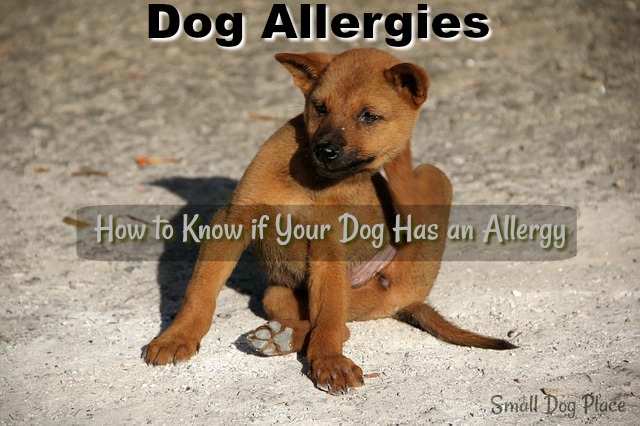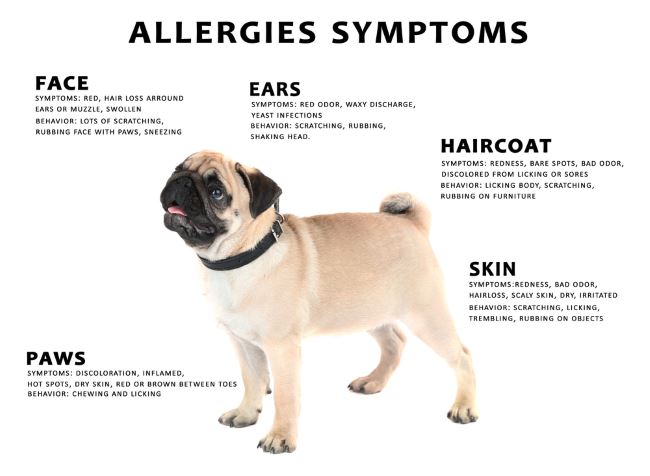- Small Dog Place Home
- Diseases
- Dog Allergies
Dog Allergies: How to Know If Your Dog Has an Allergy?
Does Your Dog Have Allergies? by Janice Jones
As a pet owner, you always want the best for your pet. However, it can be hard to understand what your furry friend goes through. Hence, you must be particularly attentive to changes in their behaviors or appearances to make sure that you are attending to their needs.
 Dog Allergies: How to Know if Your Dog has an allergy.
Dog Allergies: How to Know if Your Dog has an allergy.An example of a reason for these changes includes times where your dog has an allergic reaction. It can be challenging to identify why your dog may be suffering from allergies.
These may include dog allergies to things that dogs inhale, known as “atopy,” and allergies to things that they eat, known as “food allergies.”
Dog Allergies: 8 Symptoms You Can't Ignore
The following list will go more in-depth with some signs that may suggest that your dog is suffering from allergies.
Itchy, Red, Moist Skin
The most common manifestation of dog allergies is the skin and ears. Itchy red, moist and inflamed skin may be the result of an food allergy or an allergic reaction to something in the environment.
If your dog is scratching itself more than usual, it may be an allergic reaction in the form of a rash. You may want to take note of where your dog has been scratching itself so that you can check for rashes or bumps on the skin in that area.
These rashes could be caused by plants they are allergic to, including ones such as poison ivy. However, irritation could also be caused by road salt or landscaping chemicals. You may also consider if you have gotten a new rug or new floors. Your dog may be allergic to the chemicals present in either of these.
Food allergies can sometimes also cause itchy limbs, face, and feet. This is why you may find your dog chewing their toes more than the usual grooming.
Fleas are another common parasite that will cause an allergic reaction, leaving a red, moist rash that is very itchy to the dog.
Flea allergy dermatitis, or FAD, is caused not by the flea, but by the saliva of the flea. Once the dog has been bitten by the flea, an allergic reaction occurs causing inflammation and a severe itching response.
Some dogs suffer from FAD more than others and the number of fleas do not seem to be in line with the severity of the reaction. One flea can start a reaction, whereas other dogs may have many fleas and not show the same response. To determine if fleas are involved, look for fleas or the flea's excrement that resembles coarse black pepper. A fine toothed comb will pick up the flea excrement or "dirt" easily.Hair loss can also accompany a severe flea infestation.
It is very important to monitor your dog’s excessive scratching as this kind of skin inflammation can lead to secondary problems such as superficial bacterial infections, hotspots, ear infections and anal-gland infections.
If you regularly check your dog's skin, you will be able to detect changes very quickly. Look for:
- Hair Loss
- Inflamed red skin that may feel warm to the touch
- Hotspots
- Hives
- Discolored hair and skin on paws due to excessive licking
- Constant licking
- Constant scratching
Vomiting
Dog allergies are not the only cause of vomiting, but if your dog is allergic to the food he is eating, you may notice vomiting and diarrhea among other symptoms.
Even if your dog does not have an allergy to a specific ingredient in his food such as beef, chicken, corn, wheat, soy, or eggs, he may still have a sensitivity which may lead to vomiting.
Red, Watery, Puffy Eyes
When dogs are allergic to something in the environment such as dust, pollen, or cigarette smoke among others, you may notice eyes that are redder and watery.
If it is a seasonal allergy to something such as pollen, these symptoms may only appear during the season when the allergen is present in the highest concentrations.
Diarrhea
Dogs can occasionally have diarrhea due to a simple upset stomach. However, if this occurs over a longer period of time (usually, more than a day), then this symptom may be more serious.
This could be a sign of a food allergy. If this happens, you might want to check the food that your dog eats and find out if it is allergic to a particular ingredient.
Constant Licking or Biting at Paws
When you notice your dog licking a particular part of his body such as a leg or paw, there is a good chance he is showing an allergic reaction to something in his environment.
Paws are very sensitive and the part of the dog's body that first comes into contact with grasses, chemicals on carpets, or pesticides that have been sprayed in his environment.
Constant licking or biting at his paws could also indicate a behavioral issue such as a compulsive disorder, but it is best to rule out dog allergies before moving onto a behavioral diagnosis.
Ear Infections
If your dog has a persisting ear infection that doesn’t seem to heal, it could be a sign that this symptom is caused by something other than built-up earwax.
If these ear infections are frequent, it can suggest that your dog’s body is potentially reacting to an allergen. In this case, the ear infection doesn’t heal since it is triggered or worsened by continuous exposure to allergens. These can include things like pollens, mold, dust, feathers, cleaning products or even certain foods.
Ear infections are easy to spot because the ears will be red, inflamed and have a bad odor. The dog might scratch his ears constantly or shake his head. In severe cases, the outer ear flap may swell causing even more discomfort to the dog.
Sneezing
Just as humans get sniffly and sneeze due to allergies, so can your dogs! Dogs can also have seasonal allergies and may also react to different environmental pollutants.
If you find your dog sneezing away every time they go outside (especially in the Springtime), it may be a sign that it is allergic to common allergens like pollen, ragweed, mold or even grasses.
However, these allergens are not only limited to the outdoors - they may also come from the indoors.
Things like dust, perfume, carpet powder or other cleaning products may trigger an allergy in your dog. Ultimately, it’s important to find out what items are close to your dog when it starts to sneeze.
Vomiting
Vomiting is a very concerning sign. In milder cases, it is likely that your dog has simply eaten something they shouldn’t have and are simply having an upset stomach.
However, this can sometimes be due to a food allergy. In these situations, it is important to monitor what is in your dog’s vomit and how frequently it does so.
Testing for Allergens
The only true way to concretely diagnose what kind of atopic allergens your dog is allergic to is to perform skin testing. These results can then be used to determine what contents should be put into the allergy shots that can treat your dog’s allergies.
Conversely, if you and your vet suspect that your dog has a food allergy, your vet may ask for a detailed dietary history of your dog and will subsequently suggest diets that will help narrow down what foods your dog may be allergic to.
Once this diagnosis is made, your dog can be cured of its food allergy by avoiding that allergen. Ultimately, if you cannot identify what allergens your dog is sensitive to, your vet is your best bet since they can help you administer these tests and can inform you on how to proceed.
Author Bio: Keira Hawkins, Dog Allergies: How to Know If Your Dog Has an Allergy?
Keira Hawkin was born in Philadelphia in 1983. Moved in 2001 for studies in Manchester. I graduated Veterinary Science and Social Work.
Now I`m household mother of two and take care of my animals. We have 6 dogs and 2 cats. From time to time I treat my neighbor's and friend's animals.
About Janice (author and voice behind this site)
Having lived with dogs and cats most of her life, Janice served as a veterinary technician for ten years in Maryland and twelve years as a Shih Tzu dog breeder in Ohio.
Her education includes undergraduate degrees in Psychology with a minor in biology, Early Childhood Education, and Nursing, and a master's in Mental Health Counseling.
She is a lifelong learner, a dog lover, and passionate about the welfare of animals. Her favorite breed for over 50 years has been the Shih Tzu, but she has also lived with Poodles, Maltese, Yorkshire Terriers, Beagles, English Bulldogs, Carin Terriers, and a Cocker Spaniel.
When not writing, reading, and researching dog-related topics, she likes to spend time with her eight Shih Tzu dogs, husband, and family, as well as knitting and crocheting. She is also the voice behind Miracle Shih Tzu and Smart-Knit-Crocheting
Does This Article Deserve Your Thumbs Up?
We always appreciate your support and encouragement. Your thumbs up means so much to us. Please like this article.
If you find this page or any page on Small Dog Place Helpful, or useful in anyway, I'd love it if you would click the small heart found on the bottom right of each page.
You can also share or bookmark this page -- just click on the:

Free Monthly Newsletter
Sign Up for Our Free Newsletter and get our Free Gift to You.
my E-book, The Top 10 Mistakes People Make When Choosing a Dog (and how to avoid them)


